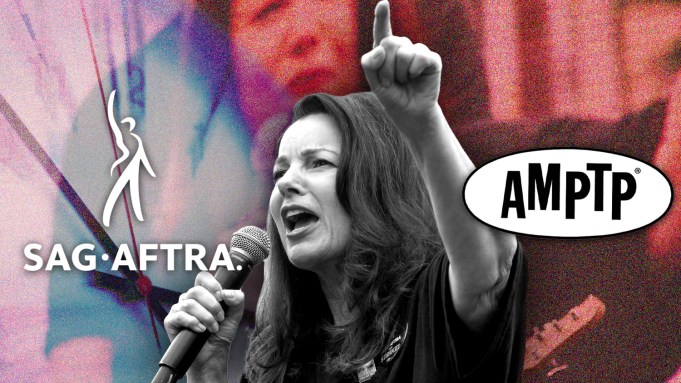
EXCLUSIVE: SAG-AFTRA and the studios don’t have a deal, but they are planning on talking more.
Any agreement between SAG-AFTRA and the studios to end the 106-day strike by the 160,000-strong guild looks almost certain to not be coming tonight, though the two sides are still in deliberations right now (Update – 5:51 p.m: the talks are now over for the day). However, it’s our understanding that the guild and the AMPTP have agreed that talks between the parties will go into the weekend — Saturday and Sunday, if necessary.
Whether those talks will continue at SAG-AFTRA’s Wilshire offices or virtual is still TBD, we hear.
We also hear that the reaction today by AMPTP president Carol Lombardini and the major studio Gang of Four — Disney’s Bob Iger, Netflix‘s Ted Sarandos, Warner Bros Discovery CEO David Zaslav and NBCUniversal’s Donna Langley– to the guild’s latest proposals wasn’t all green lights and parking spaces. “Underwhelmed,” was how one source close to the virtual session described it.
Yet, with all parties aware of the stakes at this juncture, “the AMPTP recognizes that there’s some terms there to continue to build on and talk through,” a studio insider states. The Gang of Four were less involved today than this week’s previous two sessions, with Lombardini taking the lead Friday

After shifting away in the last set of renewed negotiations from the revenue sharing demand that had been DOA with the AMPTP for months, SAG-AFTRA on October 11 proposed an approximately 57¢ per subscriber annual charge for the streamers. The notion proved the breaking point for the studios, who who walked out suddenly and suspended talks.
Speaking the next day, Sarandos deemed the proposal “a bridge too far” and “a levy on subscribers.” Noting the percentage proposal was not locked in and open to negotiations. guild president Fran Drescher and chief negotiator Duncan Crabtree-Ireland threw shade on the co-CEO’s reaction, and he and his C-Suite colleagues taking their ball and going home.
After Iger contacted Crabtree-Ireland on October 21 to re-start talks on October 24, the studios this week put on the table an offer of increased bonuses based on the success of streaming shows and movies and a rise in minimum rates. Using their now ratified deal with the Writers Guild as a roadmap of sorts, the studios had put forth a 7% increase in minimums. In their self-described “comprehensive counter,” offered Friday, SAG-AFTRA shifted its ask from an 11% rise to 9%, sources on both sides tell us.
In response to what has been a largely quiet day as both sides stay huddled, one key source close to talks remarked, “If I don’t hear anything, that’s a good thing, because it means they’re talking.”
Yesterday the vibe in the five-hour face-to-face meeting by those on the studio side echoed what SAG-AFTRA Crabtree-Ireland told Deadline on the pickets, one of “cautious optimism” for a new deal. At the same time, sources on both sides warned about reading too much into that, as major sticking points, like success-based compensation and, to a lesser degree, AI, remained.
Later Thursday night, once talks between the studios bosses and the guild had concluded for the day, an open letter was released with signatures from a slew of prolific actors including Julia Louis Dreyfus, Jon Hamm, Sarah Paulson, Chelsea Handler, Christian Slater, Sandra Oh, Daveed Diggs, Pedro Pascal, Carrie Anne Moss, Leslie Odom, Jr., Lizzy Caplan among several others who told the SAG-AFTRA Negotiating Committee that “We would rather stay on strike than take a bad deal.”
The move, which was very similar to the June letter by a slew of stars that included Jennifer Lawrence, Meryl Streep, and Amy Schumer who told SAG brass that they were ready to strike, underscored the slew of members who aren’t apt to make peace with the AMPTP just yet. Last week, a very different zoom call took place with George Clooney, Emma Stone, Jennifer Aniston, Tyler Perry, Scarlett Johansson and more whereby the A-list actors, many of whom are also established producers, were proposing to pay more into union coffers to remove union dues caps. SAG-AFTRA President Fran Drescher, in an Instagram video on the evening of October 19, respectfully pointed out such a sincere gesture wouldn’t be legal and “does not impact the contract that we’re striking over whatsoever.”
Looking at bleak Q4 results and repeats, many studio sources are anxious that if a deal can’t be reached in the coming weeks then the blow to an entertainment industry that has seen a complete global production stoppage of Hollywood TV and feature films will make at least the first half of 2024 a complete write-off. As many members of the guilds, other unions and those who are vendors to Hollywood have gone six months with no significant work, that industry schedule wipe-out would come in addition to a $6.5 billion drop the California economy has suffered since May of this year, which includes the impact from the now settled writers strike, and the loss of 45,000 entertainment industry jobs
Just today, Disney delayed two big movies on the 2024 theatrical release calendar to 2025: Pixar’s Elio and the live-action version of Snow White starring Gal Gadot and Rachel Zegler. Earlier this week, Paramount pushed Mission: Impossible 8 from next year to 2025. Altogether that’s already an estimated $1.5 billion that will be missing from the global box office next year, not just a minus for studios by movie theaters still recovering from the pandemic.
However, throughout the course of changing mediums in Hollywood history from global TV syndication to the video age, actors have had to always fight for residuals from novel technology changes. To understand how many haven’t been seeing the benefits of streaming, one writer connected to Lucasfilm’s Andor series told Deadline before the WGA strike that they’d make more in their career from the ABC broadcast of a handful of episodes versus the show’s life on Disney+.
Or as recently overwhelmingly re-elected Drescher asked in a 100-day actors strike exclusive column on Deadline: “So, where is the money?”
“Clearly, it’s not in the old residual payment structure designed for linear TV and it’s not in the current residuals compensation for streaming. It is in the pockets of the CEOs and on the balance sheets of the companies,” she said, partially answering her own question.
“Sadly, I’m not at all surprised that our employers, bedazzled by the vast sums of investor money being thrown at their businesses, didn’t consider the performer’s ability to make a living in SVOD while they were negotiating their own rich deals,” the SAG-AFTRA boss added.
And that’s why everybody’s working this weekend, to paraphrase Loverboy’s big hit from the 1980s.
Must Read Stories
SAG-AFTRA Strike
Subscribe to Deadline Breaking News Alerts and keep your inbox happy.

